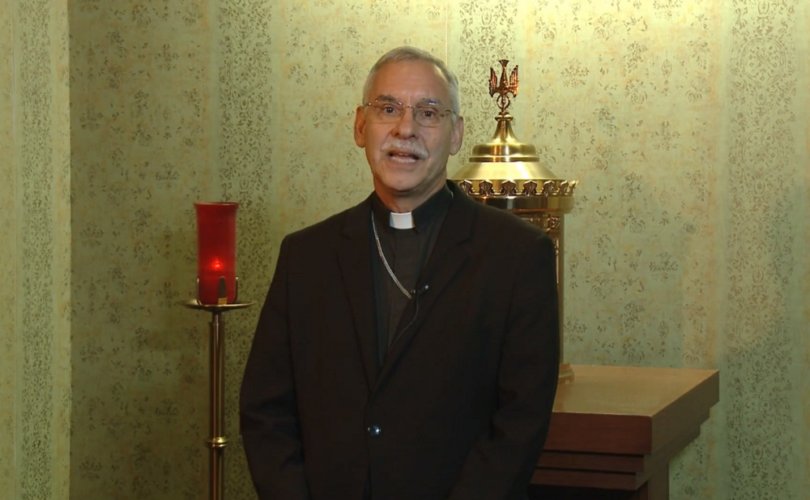LITTLE ROCK, Arkansas, March 13, 2020 (LifeSiteNews) — The first bishop in the United States to cancel all public Masses up to and including Easter Sunday is Bishop Anthony B. Taylor of Little Rock, Arkansas. He also suggested that it “would be problematic” to anoint the sick if they are infected by the coronavirus.
In a letter sent out to Catholics in his diocese (page 1, page 2), Taylor states, “Except for small parishes, only those entering the Church through RCIA may be present physically for the Triduum.” All other faithful “may participate in Triduum services via TV or electronic media.”
The Triduum Sacrum comprises the three holy days of Good Friday, Holy Saturday, and Easter Sunday. Liturgically, the Triduum starts with the Mass of the Lord’s Supper, an evening Mass on Maundy Thursday.
On Palm Sunday, which is the Sunday before Easter, “priests will hold a short private service.” Afterward, the faithful may come and pick up blessed palms, “which will be made available outside of church.”
Public Masses will be canceled starting Saturday, March 21. Only “small groups” will be able to come together for Mass. The bishop did not provide guidelines as to the size of those groups, saying it is “at the discretion of the priest.”
“Although these measures seem drastic, our faith also binds us together in ways that run deeper than our public gatherings,” bishop Taylor said in conclusion. He did not clarify what bond runs “deeper” than the “public gathering” of celebrating Mass.
In a separate letter to the priests of his diocese, Taylor said giving the sacrament of anointing of the sick to people suffering from coronavirus “would be problematic.” The very exposure to them “would make you a danger to others.”
Instead, the bishop recommended leading “such persons in prayer for healing, maintaining a distance of at least 3 feet.”
According to the Catechism of the Catholic Church, the Church “believes and confesses that among the seven sacraments there is one especially intended to strengthen those who are being tried by illness, the Anointing of the Sick.”
Nevertheless, Bishop Taylor encouraged priests to anoint only “all those who request this sacrament who are vulnerable due to an impaired immune system or the infirmity of old age,” instead of actually being sick.
He pointed out that this was a recommendation, not mandatory.
The bishop also dispensed all the faithful from fulfilling their Sunday obligation, starting this Sunday. He recommended that the parishes offer Eucharistic adoration. If the faithful cannot participate in adoration, they should take part in a Mass “via TV,” the bishop wrote.
According to the Code of Canon Law, Catholics are obliged to participate in Holy Mass on Sundays and on holy days of obligation, such as Christmas. “Moreover, they are to abstain from those works and affairs which hinder the worship to be rendered to God, the joy proper to the Lord’s day, or the suitable relaxation of mind and body.”
If it is not possible to attend Mass, “it is strongly recommended that the faithful … devote themselves to prayer for a suitable time alone, as a family, or, as the occasion permits, in groups of families.“
The Catechism of the Catholic Church further explains that Sunday Mass is “at the heart of the Church’s life.” It is “the foundation and confirmation of all Christian practice.”
“For this reason the faithful are obliged to participate in the Eucharist on days of obligation, unless excused for a serious reason (for example, illness, the care of infants) or dispensed by their own pastor. Those who deliberately fail in this obligation commit a grave sin,” the catechism adds.
By attending Mass on Sundays, Catholics give “a testimony of belonging and of being faithful to Christ and to his Church. The faithful give witness by this to their communion in faith and charity. Together they testify to God’s holiness and their hope of salvation. They strengthen one another under the guidance of the Holy Spirit.”
Bishop Taylor also declared that “non-essential gatherings” throughout March and April are canceled or postponed. He explicitly included the sacrament of confirmation among the “non-essential gatherings,” even though the catechism explains that “the reception of the sacrament of Confirmation is necessary for the completion of baptismal grace.”
The Catechism continues, “For ‘by the sacrament of Confirmation, [the baptized] are more perfectly bound to the Church and are enriched with a special strength of the Holy Spirit. Hence they are, as true witnesses of Christ, more strictly obliged to spread and defend the faith by word and deed.’”
While face-to-face confessions are suspended, priests are still allowed to hear confessions “with a physical screen/barrier.”
Holy water fonts “shall be drained and dried until further notice.”
According to official numbers provided by the Centers for Disease Control and Prevention, there are 1,215 cases of coronavirus registered in the United States. In all of Arkansas, there have been fewer than five cases.
The Diocese of Little Rock is going beyond even the archdiocese of Seattle in its measures. King County, of which Seattle is a part, reported 270 cases of coronavirus and 27 deaths.
Bishop Charles Morerod of Lausanne, Geneva, and Fribourg in Switzerland had already canceled all public Masses until May 15, 2020, including Easter Sunday. “It’s impossible to guarantee the two meters social distance between people,” he argued.
LifeSiteNews has published an article outlining various reactions to the coronavirus epidemic.

